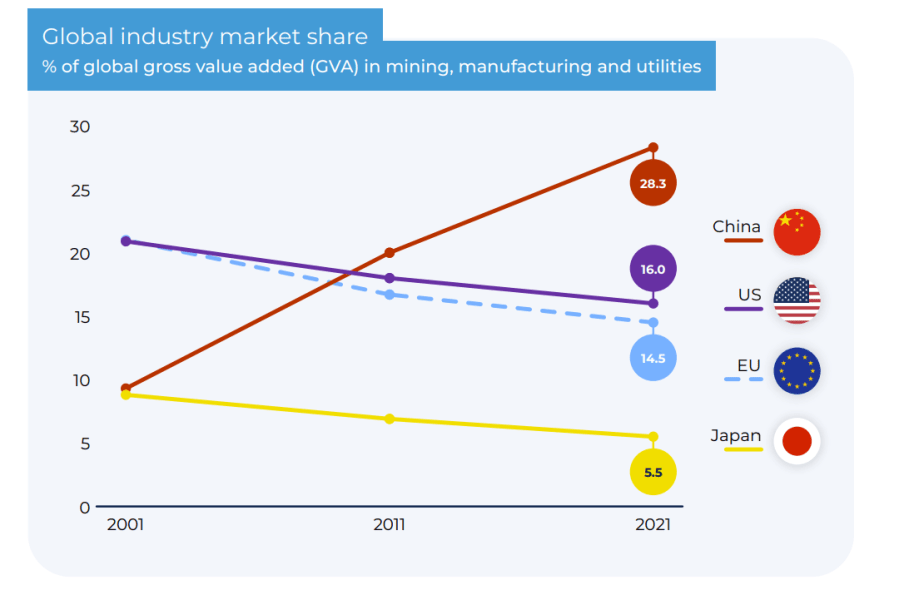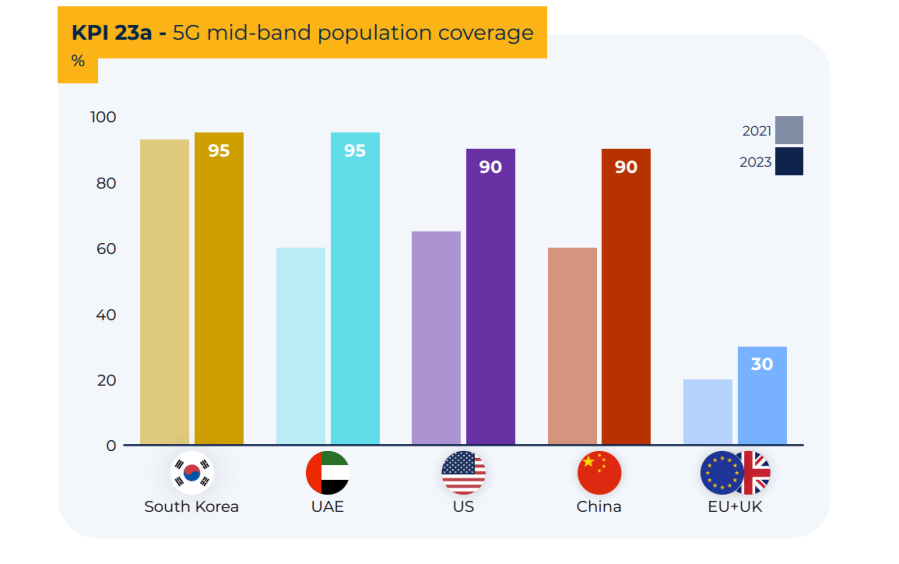The European Union (EU) is one of the world’s most prosperous regions. With a population of over 450 million people and 23 million businesses, the EU accounts for 14% of global GDP and is the world’s largest integrated Single Market.
However, the EU faces important transitions in the digital, environmental and governance spheres, with the addition of new Member States and further integration of its markets. This is taking place in a complex global context, which challenges competitiveness and welfare.
Ahead of Mario Draghi´s State of Competitiveness report, the ERT calls for a decisive and coordinated action to strengthen Europe´s competitive position in the new European policy and institutional cycle Europe 2024-2029, building on its strengths.
The EU’s competitive strengths
Europe stands out as a leading industrial power in the world and its position on the global stage is underpinned by a number of key factors that have shaped its industrial strength over time. First, Europe’s industrial heritage is undeniable. Since the dawn of the Industrial Revolution, the continent has been an epicentre of development and progress in key sectors such as manufacturing and technology. This solid historical foundation has laid the basis for its continued innovation and leadership in various industries.
Diversification and specialisation are also hallmarks of the European economy. With a wide range of sectors, from automobiles to biotechnology, Europe has managed to reduce its dependence on specific industries and increase its resilience in the face of economic changes.
Innovation and technology are key drivers of Europe’s industrial strength. With a robust network of universities, research centres and innovative companies, Europe’s reputation for quality and standards also plays a crucial role in its industrial position. European products are recognised worldwide for their excellence, safety and sustainability, giving them a significant competitive advantage in global markets.
ERT warns of the need to create an environment conducive to investment and innovation
However, the ERT, in its 2024 ERT Benchmarking Report, argues that the EU is losing ground in the global economy. This is the conclusion reached after comparing 38 macroeconomic and performance indicators of European industries and companies with those of other powers such as the United States, China, South Korea and Japan.
Indicators related to digital and green transition, technological innovation, infrastructure investment and the development of emerging technologies such as artificial intelligence show that European companies are losing traction and market share both domestically and internationally.

The ERT attributes this loss of competitiveness to slower productivity growth in European firms, highlighting possible shortcomings in investment in technology, digital innovation, human capital and infrastructure.
The ERT therefore urges the EU to create an environment that fosters the right incentives for investment and innovation made in Europe, with the aim of making the region the best place for companies to do business.
The pillars of European competitiveness
The ERT report identifies three pillars or key levers that the EU should act to give renewed impetus to its competitiveness.
First, it stresses the need for industries to gain competitive advantage. The ERT argues that this will be achieved by boosting the adoption of advanced technologies, while fostering a diversified, innovative and dynamic industrial ecosystem, supported by a highly skilled workforce.
The second pillar is to deepen the EU Single Market. In this respect, the ERT considers it essential to remove the administrative and legal barriers that hinder the growth of European companies, limiting their investment capacity and their global competitiveness.
The third pillar is based on the need for pragmatic regulation. The ERT emphasises that it is crucial to create an enabling environment that makes the region the “best place to do business”. This implies promoting incentives for investment and innovation, including for the creation and development of European start-ups.
Digital transition and skills as a cross-cutting lever for competitiveness
As a cross-cutting element and the ultimate lever for Europe to regain its competitiveness is the digitisation of European companies. This phenomenon not only drives innovation and operational efficiency, but also redefines business models and opens new commercial frontiers. By embracing this digital transformation, Europe has the opportunity to revitalise traditional sectors through the adoption of cutting-edge technologies such as artificial intelligence, the internet of things and robotics.
The expansion of e-commerce and digital platforms gives European companies direct access to international markets, removing geographical restrictions and fostering competitiveness in a globalised environment. This democratisation of market presence drives diversification and business growth, strengthening Europe’s position in the global economy.
However, the success of this digital transition depends to a large extent on the ability of Europe’s workforce to adapt and thrive in a digital environment. Investment in specialised education and training is essential to provide workers with the skills needed to take full advantage of the emerging opportunities in the digital economy. This focus on human capital development ensures a skilled and adaptable workforce, which in turn strengthens Europe’s competitive position on the global stage.
By capitalising on this digital revolution with a strategic focus on skills and human development, Europe can consolidate its position as a world leader in innovation, competitiveness and economic prosperity.
Connectivity is a lever for competitiveness and for the digital transition
In this context, the ERT highlights connectivity as a key pillar for competitiveness. Indeed, connectivity infrastructures, 5G and fibre, and the technologies they enable, including Artificial Intelligence, B2B applications and IoT, are essential for the digital and green transition, transforming industries, driving digital innovation, combating climate change and declining productivity growth, as well as driving improved services.
However, the report concludes that progress towards building key digital infrastructures, such as 5G, remains slower compared to other countries, resulting in lagging digital adoption. Similarly, it highlights the disparity between EU countries in the deployment of quality connectivity, which could lead to an uneven pace in the digital and green transition.
The ERT therefore urges the EU to incentivise private investment in quality connectivity, based on fibre and 5G technologies, by modernising the current regulatory framework, reducing barriers to network deployment and harmonising spectrum allocation conditions. It also calls for further market consolidation at national level to allow telecoms companies to acquire the necessary scale to be viable and to accelerate investment.

A call to action
Given the state of European competitiveness, it is urgent that the European institutions strongly support quality connectivity and sustainability of telecoms operators in all Member States, reducing regional disparities in technological development and access to digital services through a regulatory and competition policy environment that promotes investment and innovation. This will undoubtedly contribute to boosting the digitisation, transformation and competitiveness of European businesses, economic growth, cohesion and prosperity in the region. With the right mix of investment in innovation, infrastructure, digitisation and human capital, Europe will be ready to maintain and strengthen its position as a global industry benchmark.
ERT 2024 Benchmarking Report is a benchmark in the identification and collection of key indicators for monitoring the state of EU competitiveness. The report provides useful guidelines for policy makers to strengthen the EU’s industrial competitiveness and strategic autonomy.







